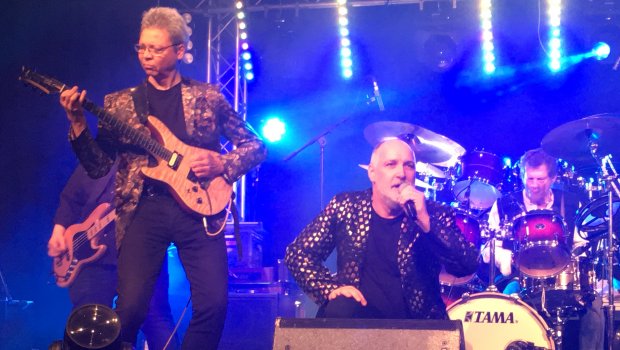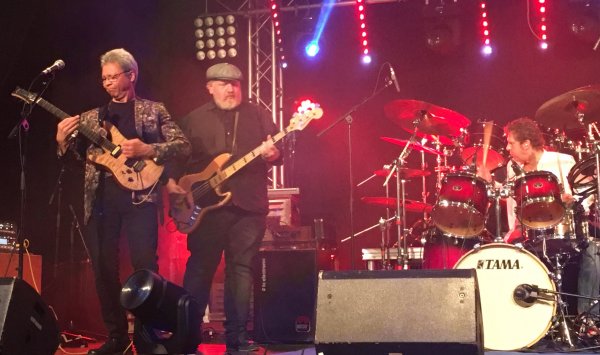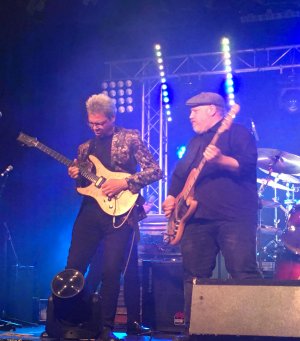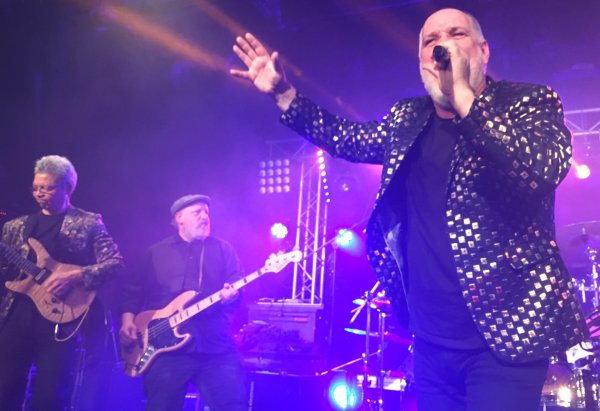In anticipation of Antenna, the new album from The Gift, TPA’s Tony Colvill recently had a chat with singer Mike Morton, and as a bonus Leo Trimming spoke with Mike and guitarist David Lloyd at the Fusion festival in March.
Tony Colvill
First question, why Antenna? A device for transmitting and receiving information, are you transmitting or replying to things that fans have said about you?
The songs are not a response to fans’ views on The Gift, nor a message to them per se. The theme of many tracks on the album is communication… or more accurately about how tricky it can be, especially with people we are emotionally invested in. We didn’t consciously choose this as a concept, though. We just noticed it when we put them all together. ‘Antenna’ is a cool word and places a strong image in the mind, as well as suggesting ‘send and receive’. But that was a retro-fit, if you like. In all honesty, we stumbled on it as a title when Stef (Dickers, bassist) suggested we think of a place name linked to our past music-making, like Abbey or Stanley Road, and I flashed on ‘Antenna’ because it was the first rehearsal studio we occupied as a 5-piece back in 2013. As soon as it emerged, everybody agreed it suited several songs. A happy accident!
You have expressed in the past that Prog is a label of convenience, The Gift’s music not easily fitting into any genre. How much is Antenna a move away from that label?
It is a move away, but not a rejection. We love progressive rock, and we do enjoy writing complex, long-form songs sometimes. Most of my musical heroes are from Prog bands, as I think you know. But we decided to try and transcend the label this time because the scene is small and limiting, unless you are already well established like Yes, or have devoted yourself to it for decades, like Steven Wilson (and even he is moving away now). We want to play to bigger audiences, more women and more young people, and frankly these last two are thin on the ground at Prog gigs. In addition, the stigma that still hangs over Prog restricts opportunities at venues and on festival bills, and our ambitions are big. If you think about it, most really successful bands do not conform to genre. The Beatles, Thin Lizzy and Queen, for example, made their own sound. Radiohead, Elbow, even Coldplay (whom I don’t much like) sound like themselves. That’s our aim. We just want to sound like The Gift.
 On early albums the writing was down to you, Mike. How much have you moved from figurehead to ensemble pieces?
On early albums the writing was down to you, Mike. How much have you moved from figurehead to ensemble pieces?
We have moved fully from a solo-writer situation to full group-writing. ‘Ensemble’ piece may not be quite right, though, since none of the pieces are written from scratch as a 6-piece or emerge from jamming in the studio. We now have four main writers in David, Leroy, Gabriele and myself. Each contributes their own songs, and these are then refined and arranged by everybody. In fairness, only Awake & Dreaming and Land of Shadows were mine alone. Why The Sea Is Salt featured songs from three of us, with David and Gabry writing big chunks. So the transition has been ongoing for some time. This album is mostly the work of David, myself and Leroy, as Gabry has been very busy in the classical world this last year and so he did not have so much time to write for The Gift.
I’ve heard two tracks so far, both live, and they are both different, but very driven in their energy. The Gift live are a dynamic but also heartfelt and emotional act, and I have said to you before that the first two albums are beautiful, but miss that live energy. Have you, do you think, managed to capture that raw live feel on Antenna?
We hope we have, yes. If so, it may be in part due to getting the drums and bass down live first, then doing more spontaneous takes afterwards. The other albums were put together like a jigsaw in the studio, and I think you can hear that.
You describe The Finest Hour live as your T-Rex track, though I think it’s more The Clash. It is a cracking song, more pop than progressive, a deliberate shift or will you now try to sit in both camps?
Like I said before, we don’t even think about which camps to sit in. We just write songs that excite us and make us feel good. Whatever label others choose to bestow on the band is fine with us!
Live, grins and smiles litter The Gift performances, does the same atmosphere exist in the studio?
Not so much, no. But we are not miserable, just intent. We are rarely all in the same room together, anyway, and we’re quite perfectionist when it comes to recording. We’re too old to be falling into the studio half cut or post-partying! It’s very rewarding to be meticulous, though… you’re aiming for the best take, and it really focuses the mind. I can forget to eat or sleep. I think there is a point to be made here about the difference in the environment. When we are onstage we have rehearsed, we know the songs, and we get a kick out of all being mates, performing together. But recording is much more nuanced and so you need a calmer energy.
Were any of the songs recorded as a performance, by that I mean one take?
None of them were done like that. In some cases we captured the rhythm section together, but our kind of stuff is seldom recorded in the way you describe. I can’t think of any serious act nowadays who would do that… for better or worse. We would ideally like to move more towards full live capture, as they did in earlier decades, and then overdub, but there is a lot of focus on musical and sonic precision in recording these days. People seem less tolerant of a fluffed drum fill or semi-sharp vocal, for example. To some extent, we conform to that demand. But to get the best vocal, I avoid automated tuning. I prefer to record multiple takes and then make a composite of my best individual lines. This is very common, even in gnarlier or more apparently rough genres like metal and hardcore! I hope that doesn’t disillusion you…
It’s a lifetime away from a classical recital, does Gabry get the same adrenaline rush from his rock persona as the classical recitals?
You’d have to ask him! But I’d wager that he gets more fun and a bigger ‘stage-rush’ from The Gift. Whereas the technical demands of playing Chopin or Shostakovich probably give him more of an adrenaline rush in his fingers.
How did you pick and choose your topics for songs on this album?
There was no manifesto, nor any clear plan. Like a lot of writers, we just wrote what occurred to us. The collective theming was retrospective, and this was also true on Why The Sea Is Salt. In both cases we noticed the connections between songs whilst looking for a title, after the event.
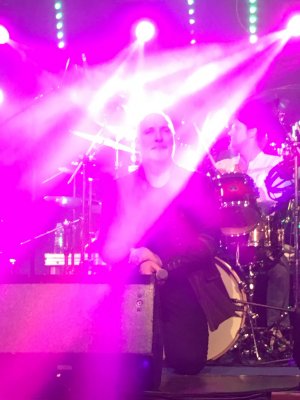 You have mentioned that Changeling is about the current state of the world/country. Could you give us a brief synopsis of each track?
You have mentioned that Changeling is about the current state of the world/country. Could you give us a brief synopsis of each track?
Sure. Here goes:
We Are Connected – The ills of social media. Exhibitionism, voyeurism and loneliness.
Changeling – A once principled politician is corrupted, first by his ego, then a dark cabal.
Back To Eden – How we age, feel fear, then return to our true home.
Long Time Dead – An exhortation to never regret anything. Carpe Diem.
Snowfall – The end of a long relationship. Accepting loss and feeling faint hope.
Far Stranger – A.I. learning how to dominate humans.
Hand In Hand – Instrumental. But its beauty makes my eyes moist.
Wild Roses – Remembering a passionate relationship you rejected. Remorse and lust!
When You Are Old – Words by Yeats. Another lament for a lost love.
Closer – Estrangement after years together. Hopeful call for better intimacy.
The imagery for Antenna released so far is very Art Deco, not dissimilar to Led Zeppelin’s Mothership; is this a reflection of a harder edge, or just a stylish representation?
Both. I love Art Deco and the propaganda art of the period. The artwork is both a reflection of the more direct, less baroque musical style, and an attempt to broaden our visual appeal. There is only so long you can have mermaids, mythic tones and sub-surrealism on an album cover.
You have a number of dates lined up, festivals, mini-tours, will you pursue more to promote the album?
There will be many more live events to promote the album, both this year and on into 2020. One of the things which dogged us in this regard late last year was disruption in my personal life (where did those song themes come from?). I am generally the hustler for the band, and in my absence we missed the boat with a fair few 2019 festivals. But we are rectifying this as we speak, as well as staging our own self-managed events.
You have a great double headliner lined up with Encircled at Bilston. Do you see this sort of gig as a means of attracting bigger audiences? Two bands, subtly different, but both dynamic with great tunes.
Thank you. Yes, all our gigs are intended to attract bigger audiences. The Robin 2 has a large capacity, more of a rock crowd, and Encircled are a top band with a solid local Midlands following, so we are hopeful about the outcome.
The line-up has the feel of ‘family’, you obviously enjoy working together, do you think you are now in a cycle of tour, album, tour, write, record, promote, new album, tour?
We are really good friends. I love every member of the band like a brother. They are true Gentle Men, as most musicians are (with some notable exceptions… no names!). The only thing we ever have minor squabbles about are music and band strategy, and that is a healthy kind of conflict, always resolved (touch wood)! I think we are very much in the cycle you describe… with the caveat that we all do other things and have families, so the gaps between stages might be quite long.
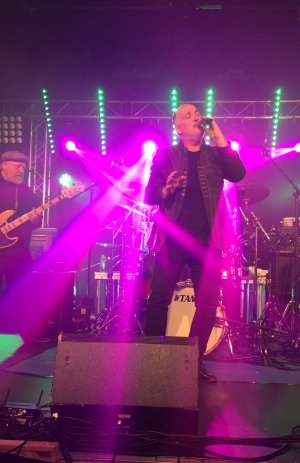 If you get the bigger gigs, will you forget the ones where you started?
If you get the bigger gigs, will you forget the ones where you started?
Yes. We shall become monsters, insist on a personal masseuse, Bolly and blue Smarties in the rider, and never talk to you again. Of course we won’t!
Any places you really want to play? Home and abroad? It’s part fantasy so no limits.
I would love to play the Hammersmith Odeon, Bataclan and Budokan! Also Glastonbury, Cruise To The Edge and RosFest. Another place that would be special is Verona, Italy… and this is on the cards. Oh, and Loreley Amphitheatre, which is also within reach in the short term.
Earlier The Gift songs have come very much from the heart, do you think that is the result of upbringing, and do you find with co-writing your canvas is becoming more of a collage of your combined inputs?
I think my own songs have mostly sprung from my spiritual and emotional concerns, and I would place much of that influence on my parents, who were both thoughtful people with a liberal, philosophical approach to life. So yes, that is a good insight. My father taught me how to think, my mother gifted me with a love of words. The musical preoccupation used to both amuse and mystify them, though, because they were not that way inclined at all. They liked music, but it wasn’t so important to them. Co-writing has undoubtedly created a broader range of lyrical concerns, as well as musical diversity. David is more of an observer of situations, and reflects on social or cognitive themes like consumerism (All These Things), alienation (We Are Connected) and technology (Far Stranger) whereas I’ll more often opt for autobiographical disclosure or political allegory, and even that is coloured by my feelings. Leroy – in his own words – is more ‘Neanderthal’ and often starts with a groove, rhythm or riff first, then sees where that leads the lyrics.
Do you have a favourite on Antenna?
Aarrgh! That’s impossible. I can’t choose one. But the three songs I feel most consistently excited and affected by are Wild Roses, Changeling and Snowfall. I’m proud of all the pieces, though, and feel there isn’t a weak track on Antenna. I am, of course, far from impartial.
[You can read Tony’s review of Antenna HERE.]
Leo Trimming
The Gift played an outstanding set at the recent Fusion Festival in the Midlands, and later vocalist Mike Morton and guitarist David Lloyd joined TPA’s Leo Trimming for an interesting chat about the gig, the band and the ideas that have influenced their imminent new album, Antenna.
Hi Mike and Dave. I enjoyed the gig. How did it go for you?
David Lloyd: Well, we’re a man down because Leroy (James) couldn’t make it.
Personally I’m disappointed that at least his legendary shoes didn’t turn up!
Mike Morton (Laughing): We did try. I actually phoned Leroy and asked for a pair of his shoes to put on stage under a spotlight, but he was doing the Sound for a cheerleading at the Birmingham N.E.C
Cheerleading?… Perhaps we’ll edit that from the interview as he’ll have some credibility issues with that!
(Laughter)
Mike: Leave it in frankly. (Laughing) More seriously, it was a great gig.
David: We had a great time, and we tried out a couple of new songs, which seemed to go well. We were very pleased with those, and we had a massively warm response from the audience.
They went down very well indeed. Tell me about the new songs – they seemed a change in direction and impressed me.
Mike: The first new song was We are Connected, which is one of David’s songs. The Glam Rock stomp was one of my songs called The Finest Hour. [The Finest Hour has subsequently been amalgamated as the conclusion into a longer piece on the new album called Changeling.]
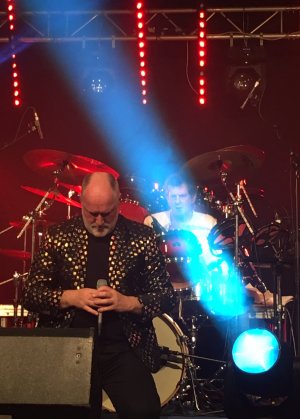 That song certainly got everyone on their feet, which is rather unusual for a Prog Festival! We are Connected was excellent as well – is it about social media?
That song certainly got everyone on their feet, which is rather unusual for a Prog Festival! We are Connected was excellent as well – is it about social media?
David: It’s about the way in which people have sold their soul to social media. There are obviously some very positive things which come from social media, but it comes with a lot of downsides. The song is about the way people can be damaged or manipulated without really realising it, just through participating in it. It’s got a corrupting side to it.
I think it’s the insulation of being the other side of a device. People feel can say things they wouldn’t think of saying to someone in the street.
David: That right.
Mike: It divides rather than unites people too often especially on ‘Big Issues’. People become obsessed with being approved of which I don’t think is healthy.
David: There’s a paradox in it. The isolation that comes, as you say, from being the other side of the device, is apparently a mirror on the world. It creates the illusion that you are connected to people in ways you simply are not. That idea of connectivity is very appealing, but it’s making people in various ways more and more isolated.
I think there’s an Arthur C. Clarke sci-fi story with that idea – we all just live in pods only connecting remotely.
David: Well, interestingly, there’s an E.M. Forster short story I’d never read called The Machine Stops, which is a title which has been used in other contexts. After the song was already written we were hunting for a name for the new album and I thought about that idea. It was a cue for me to read the short story and it was precisely about the Internet Age.
Mike: E.M. Forster was famous for writing A Passage to India. He wrote that short story way before the Internet.
David: 1912, or about then? [The Machine Stops was first published in 1909.]
Mike: That’s SO impressive – over 100 years ago.
David: There’re so many things in it that are just really prescient about the modern age. Social isolation through the use of technology.
I will search for that short story. You mentioned the new album. Has it got a title yet?
Mike: It has… but…
You can’t tell me.
Mike: We could tell you… but then we’d have to kill you!
(Laughter)
Mike: We’re not revealing the name right now as we have a tease campaign planned. [The album’s title has subsequently been announced as Antenna.]
Mike: Suffice to say it’s a very different approach musically and in title to the rather mythical, grandiose previous album Why the Sea is Salt. That album was grand in concept, and pretty ornate in sound. This new one is more stripped down in every way.
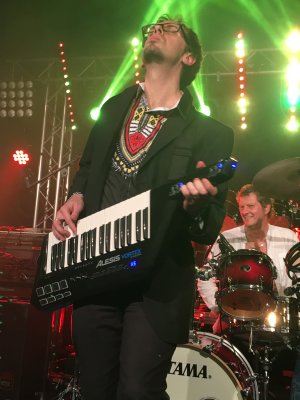 That is what I found fascinating about the set you played here at Fusion. You had things like We are Connected and The Finest Hour, which were definitely more stripped down and ‘rocky’, and then you had some very intricate ‘proggy’ stuff which gave the set great contrasts.
That is what I found fascinating about the set you played here at Fusion. You had things like We are Connected and The Finest Hour, which were definitely more stripped down and ‘rocky’, and then you had some very intricate ‘proggy’ stuff which gave the set great contrasts.
Mike: It’s not a conscious strategy. From my perspective, that’s just the material we wanted to write before and David was happy to do that stuff. We had kind of said to ourselves ‘we’re a progressive rock band.’ That’s the style we were playing, certainly on the first album, Awake and Dreaming, and when David and I collaborated on Land of Shadows. We continued to do that for the third album. It’s now not a case of saying ‘let’s strip it all down’ – it’s a case of saying ‘we just want to write different stuff’. For me it’s having a taste for new styles.
David: I think that the two tracks we played in the gig are the further edge of the new ideas we’re trying out. So, you’re right, the older stuff we played was the more ornate long-form stuff, whereas the new tracks we played are much more direct and rockier. But there are other things that will be on the new album that are sort of in-between those styles. There’s a sort of transition. For the gig, we were playing the more stripped down new material…
Mike: … partly because it’s easier to rehearse…
David: …and because we were a man down.
It was an interesting contrast, I’m not complaining about that at all! I like that difference, and it actually went down very well with the crowd in a live context. They’re clearly very much songs that sound great ‘live’.
David: Definitely.
Mike: But also for the dynamics of a set I like that ‘peak and trough’. For example, after The Willows, which a lot of people like which is very ‘Prog’, we went straight into that thumping glam rock. I think that very surprising change is what makes it exciting – we go for the high contrast.
Is there a general theme to the new album?
Mike: Yeah, I see the new album as being about our attempt to connect with people and communicate, but invariably failing to do so. So there are some songs about people trying to salvage a relationship and there are other songs about people in public life like a politician, as in The Finest Hour, who are trying to do good, but fail. So, if I was to sum it up in a phrase, for me the album is about communication missing the mark, the connections failing. ‘Broken Plugs and Sockets’ to put it as a metaphor.
David: I think there’s another strand implicit in We are Connected – The way in which people’s identity is becoming more and more shaped by technology. So it looks towards things like Artificial Intelligence, implants – cyborg-type technology – the evolution of humanity. It also has other resonances for gender fluidity and things like that – about how you define your own identity, and what it means to fight for that in a context in which it is difficult to establish that against entrenched patters about what people think of as being human identity.
That sounds really interesting. Your previous album was quite mythical in parts whereas this one is very much embedded in modern realities.
David: I think that’s right.
Mike: If I was asked to come up with a defining slogan I’d say it’s about the ‘difficulty of being Human’, which links to failed communication. We played around with album titles around the theme of ‘Almost Human but not quite’ but we never found anything we liked – but we’ve got a good title now.
The risk with the ‘almost human’ idea is that it might have driven you down a possibly cheesy sci-fi cyborg route?!
Mike: If you imagine Why the Sea is Salt as a lush oil painting then this one is much more modern. The music is more hard-edged and angular in general, and the artwork images will be similar.
Mike: A guy called Brian Mitchell who did the Awake and Dreaming album re-launch cover art, and he also did Land of Shadows. He also did the overall design of Why the Sea is Salt, but Mark Buckingham illustrated it.
Those are great covers, particularly the Awake and Dreaming re-issue.
Mike: I’m pleased to hear it – he’s going to smash this one.
Earlier you mentioned the new songs being written by each of you. How does the songwriting process work in The Gift?
David: It’s a bit hybrid I suppose. There are four principal songwriters in the band – Mike, Gabry [Gabriele Baldocci – keyboards], Leroy [James – guitarist] and myself, although Stef [Dickers – bass guitar] and Neil [Hayman – drums] do contribute to the development process. There are some songs that end up being more or less one person’s ‘baby’, as it were, but there’s all sorts of different collaborations and configurations. Mike and I write together sometimes. Gabry and Mike write together.
You two (Mike & David) have worked together since Land of Shadows.
Mike: We blend very quickly. One of us will originate the core of a song and normally take it to the other and they’ll develop it. So, if I say one song is mine what I mean is the basic idea is mine and David’s run with it and added to it, and vice versa. David will present me with a well-developed song but I’ll still put my stamp on it.
David: We’ve done three-way pieces with Gabry.
Mike: Sweeper of Dreams on the last album was a triangular three-way creation between us.
What comes first? The music or the lyrics, or does it change around?
David: It could be either way for me, and sometimes it’s simultaneous. I don’t have a formula. It’s generally a musical idea or it might be a concept that then finds expression in some words or music.
Mike: It’s a bit different for me. I get excited about telling a story. So I might say ‘Brexit’ for example, or ‘an abusive relationship’ and want to write a story about that theme. Then I’ll play around on an instrument with that in mind. The story comes first and then oddly NOT the lyrics – the story makes me find mood music to fit the story that’s in the back of my head. The chords and melody lead me on to lyrics.
I’m surprised – I thought you would have started with the lyrics.
Mike: No – A lot of people assume I’m the wordsmith. The words usually come last. What tends to come first for me is ‘La La La’ to a melody. As Dave says sometimes it can be simultaneous. Certain hooks come out fully formed. From somewhere in the back of your head you sing the melody and the lyric, and you’re strumming the guitar or playing the keyboard and a hook-like ‘Lay me down by the Willows’ came out and I didn’t even know what I was singing about – so there are exceptions.
What are your main influences? You have six band members so that’s quite a range.
David: There’s obviously a huge overlap in our areas of interest but each of us has got a wedge of stuff which doesn’t have immediate or obvious expression in The Gift, but it still informs what we individually bring to the band.
I know your drummer Neil is a big Emerson, Lake and Palmer fan, but I don’t hear much of E.L.P. in The Gift.
Mike: He doesn’t play like Carl Palmer. I’ll be honest and I don’t want to alienate anyone, but E.L.P. is not a band I’ve loved with a passion.
Neil did share that with me!
(Laughter)
David: Obviously Gabry has this massive classical mindset.
You can hear that in what he brings to The Gift.
David: A lot of my listening these days tends to be on the classical side rather than the rock side. Leroy is a hard rocker and a funk man.
Mike: He starts with rhythm most of the time in his songwriting.
David: Long Time Dead is one of his songs which we have played live over the last year or so, and you can hear that’s coming from a slightly different place than the sort of things with which we would be most associated.
Mike: I can’t talk for the others on their influences. I can name my influences but they’re more genres than artists so I often come from a folk starting point. I know our music doesn’t sound folky.
You can hear that on The Tallest Tree.
Mike: There’s a lot of Celtic stuff in me because of where I grew up and the songs I was sung as a kid. The Scottish thing is there. A lot of songs are like that for me, even songs that eventually don’t take a folk representation are coming from a kind of folky, country area. Hymns are an influence for me. I sometimes think ‘that sounds too hymnal’ but you’ll feel that lot in my material. There’s a lot of hymnal cadences… ‘A…aa – men’ going on in my songs. There’s also the “Big ‘G’ Band” (Genesis) but we’re trying to pull away from them, partly because we’ve done it to death. I’m the melody guy. I think a song is finished if there’s a melody I think will break people’s hearts, and then I realise we need to work it out for the band. We joke about it. I’ll say ‘there’s a song’ and David will say ‘How do you arrange it?’ and I’ll say ‘I dunno!’ (Laughing). David has said in another interview that he tends to hear the whole song with the bass and drums and the arrangement as you write it – I don’t. I need guidance.
David: Mostly I hear whole arrangements even if that arrangement does not end up being the final arrangement we play. I’ve got a clear idea how I see it, but obviously during the process of development things get changed and experimented with, but that’s the way I hear it initially.
Are you like the ‘Arranger’ for the band?
David: No, I wouldn’t say so. That’s something we take on jointly. Mike is an exception in that regard because Leroy and Gabry would bring an arranged idea to the table. Even if it’s not elaborated to the ‘nth’ degree there’ll be something for everyone to start working on.
Mike: Music technology plays into that which is worth raising. Gabry, Dave and Leroy have music technology software at home in their own home studio set ups so they’re able to layer the bass, drums, guitar and keyboards. Until very recently I’ve not invested in music technology and I think that’s playing a part. David has been encouraging me to get up to speed so I suspect once I’ve got the studio configuration worked out I will present more finished songs. I always thought like Bob Dylan that if it works on a voice and guitar then present it to other people.
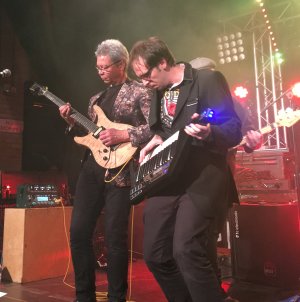 If you met someone who didn’t know The Gift, which song would you recommend to them to try to convert them to the band?
If you met someone who didn’t know The Gift, which song would you recommend to them to try to convert them to the band?
Mike: … It would depend on who they were – if it was someone who wasn’t into rock music I’d probably play them one of the new songs like We are Connected or Long Time Dead because they go down well live. If it was more of a ‘Prog’ fan I’d play them one of the epics like At Sea or The Willows or maybe All These Things, the ‘big beast’ from Why the Sea is Salt.
David: That’s a tricky question. I’d take a similar strategy – if it was a more hardcore rock fan I’d introduce them to the more recent stuff in the hope they would also look backwards at previous albums, and see how we got where we are now. For a ‘Prog’ fan we’ve got some long-form songs which are textured and detailed enough to hold people’s attention.
What are your hopes for the new album?
David: We hope to broaden our appeal. We hope to present something which pleases people who have accompanied us so far but we want to introduce some new things which hopefully would attract those people that might be a bit intimidated by the ‘Prog’ idea.
Bruce Soord of The Pineapple Thief once said that he knows he’s going to piss off some of his fans every time he releases a new album but he’ll do what he really wants to do and he’ll pick up some new fans as well.
Mike: That’s a very good way of putting it. I agree with Dave – we’re not stuck on being ‘Prog’. I’d like us to get bigger audiences, sell more records but also play different environments. The ‘Prog’ community is very warm and friendly which is great but we want to play to other people as well. We’d like to appeal to music fans and surprise people who think they don’t like rock or stuff with progressive elements. I think our new songs are strong and I’d like to appeal across the board.
David: I hope the people that have known us through ‘Prog’ like us because of our music and not just because we’re ‘Prog’. If we’re true to that idea we hope we can reach people who just like the music.
Mike: I think we will piss some people off and disappoint some because the new album hasn’t got such familiar sounds on it – that’s just the way it is.
True to yourselves.
I think we’ll leave it there. Thank you so much for your time – it’s been an interesting conversation. Good luck with the new album… oh, there is one last quick question to which you’re only allowed to give a one-word answer:
The Beatles or Elvis?
David & Mike: (Instantly and simultaneously) The Beatles!
That’s the RIGHT Answer!
(Laughter)
All photos by Leo Trimming.

